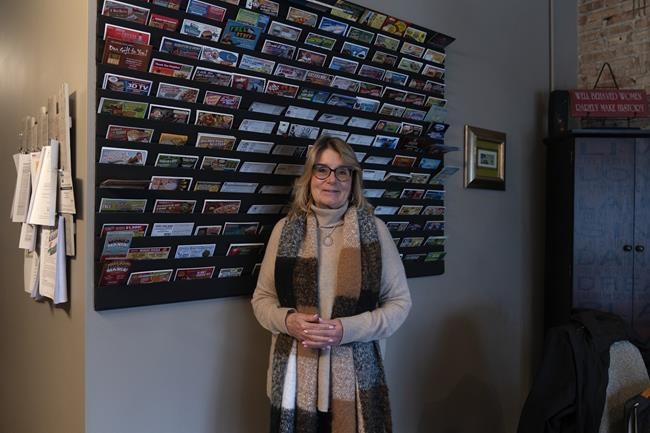CHICAGO (AP) — When Joan Van is sick, she doesn’t get paid.
The waitress at an East St. Louis restaurant and single mother of three said she works double-duty to make up for lost money if she or one of her children falls ill.
“You can’t let your kids see you breaking down because you’re tired and exhausted because you have to keep pushing. You need to. And if not, then who is going to do it?” she said.
Maybe she won’t have to for much longer. Democratic Gov. JB Pritzker, who said he will sign it, stands poised to enact a sweeping paid leave bill that would require Illinois employers to give employees time off based on hours worked, which can be used for any reason.
The requirement for paid leave is rare in the US – only Maine and Nevada have similar laws – although they are common in other developed nations.
Fourteen states and Washington, DC require employers to offer paid sick leave through similar laws, although employees can only take it for medical conditions. What sets the new Illinois legislation apart is that workers do not have to explain the reason for their absence as long as they quit in accordance with reasonable employer standards.
Maine and Nevada also allow workers to choose how they use their time, but significant exceptions apply. Maine’s earned leave law only applies to employers with more than 10 employees, and Nevada law exempts companies with fewer than 50. Illinois will reach nearly all employees and has no limit based on company size.
Seasonal workers such as lifeguards are exempt, as are federal employees or students who work part-time for their university on a temporary basis.
The legislation would come into effect on January 1, 2024. Employees are granted one hour of paid leave for every 40 hours worked, up to a total of 40 hours, although the employer may offer more. Employees can use the time from a working time of 90 days.
“Working families face enough challenges without worrying about losing a day’s wages when life gets in the way,” Pritzker said Jan. 11 as the bill passed by both chambers.
Regulations in Cook County and Chicago already require employers to provide paid sick leave, and workers in those locations will continue to be covered by the existing laws rather than the new bill.
Johnae Strong, an administrator at a small media company in Chicago, said paid sick leave helps her care for her two children, a 10-year-old and a 6-year-old. However, it would be helpful to extend the time to use for some reason.
“Life happens,” she said, adding that she hopes Chicago will update its law to be more flexible, like state law.
The Chicago and Cook County ordinances served as pilot programs for statewide legislation and reassured critics who predicted mass business closures that didn’t come to fruition, said Sarah Labadie, director of advocacy and policy at Women Employed, a nonprofit that fought for has been on paid leave since 2008 and helped push the legislation through.
“Of course, some strange things have happened during the pandemic, but that wasn’t the case before the pandemic. Chicago was a thriving economy,” she said.
Democratic Peoria Rep. Jehan Gordon-Booth sponsored the bill, which she said will “help strengthen working families” and “help people immediately.”
Newly-elected Republican House Speaker Tony McCombie said the mandated benefits could have an “adverse effect” on small businesses and nonprofits “in an already unfriendly business climate.”
“We all want a great work environment with a good work-life balance,” she said in an emailed statement. “However, Senate Bill 208 did not address the concerns of those providing this work environment.”
For Leslie Allison-Seei, who runs an advertising and sweepstakes management company with her husband in DuPage County, looking after her three full-time employees is a priority, but it’s “difficult” to compete with the company’s paid time-off policy.
“We are thrilled that this will be adopted and signed. But it’s also a little bit scary because, you know, a week — I don’t know what that would do to our business,” Allison-Seei said. “I think a lot of companies are just doing the best they can to stay afloat.”
The small business advocacy group, the National Federation of Independent Business, opposes the bill, saying it “imposes a single mandate on all employers.”
Small business owners face high inflation, increased fuel and energy costs, and a shortage of skilled workers, and the requirement will create an “additional burden,” NFIB state director Chris Davis said in a statement after the bill passed. “The message from Illinois lawmakers is loud and clear: ‘Your small business isn’t essential.’”
However, the potential burden on small businesses clashes with the needs of their workers, particularly those with children.
Van, a parent leader for Community Organizing and Family Issues, said she doesn’t have paid leave until she’s worked a year. Knowing she’ll miss a day of pay if she or one of her children falls ill is a constant stress for the Belleville mother, but a guaranteed PTO “would be great” offers her peace of mind and eases some financial worries.
Molly Weston Williamson, an expert on paid leave policies and a senior fellow at the think tank Center for American Progress, called the Illinois legislation “a big step in the right direction.”
In addition to workers’ rights to paid time off, the law prohibits employers from retaliating against workers for using them. This is key to ensuring that “low-income workers, or other people who are more vulnerable, are really practically able to take the time,” Williamson said.
Paid leave is both a labor rights issue and a public health issue, Williamson said. Service workers like Van who handle food and drink without paid time off are more likely to go to work sick and send their kids to daycare sick, “at that point everyone else is getting sick,” she said.
“Especially now that we’ve been impacted by a global pandemic for more than three years, I think we all have a much deeper understanding of how all of our health is interconnected,” Williamson said. ____
Savage is a corps member of the Associated Press/Report for America Statehouse News Initiative. Report for America is a nonprofit national service program that places journalists in local newsrooms to cover undercover topics.
Claire Savage, The Associated Press
Don’t miss interesting posts on Famousbio










